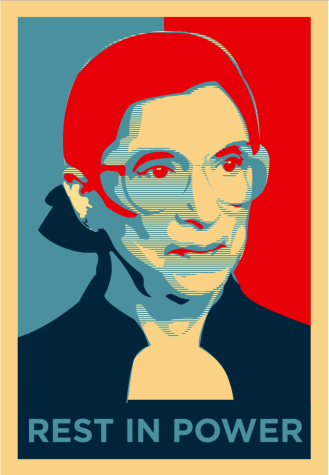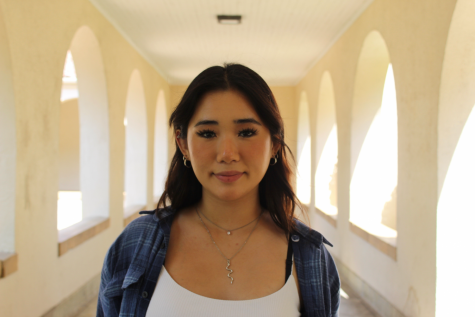Students, staff grieve and fear the effects of RBG’s passing
September 27, 2020

Just days since the passing of Supreme Court Associate Justice Ruth Bader Ginsburg, students and staff of the Palo Alto High School community say they are mourning the loss of a hero but also worrying about the future of the U.S. government.
“It was a shock for me to be honest,” freshman Anna Shimazaki said. “She was an amazing person and cared about other people’s rights. It’s definitely going to take some getting used to.”
Ginsburg passed away last Friday after years of battling pancreatic cancer. As the second female Supreme Court justice appointed in history, Ginsburg fought endlessly for women’s rights and equal protection during the twenty-seven years of her term.
“The nation is lessened with her death,” AP U.S. History teacher John Bungarden said. “The political discord that has been a feature of the last three years seems likely to worsen. Many of the civil rights championed by Justice Ginsburg appear likely to be threatened, along with the stumbling efforts to expand healthcare accessibility to all.”
Ginsburg’s passing leaves a seat open in the U.S. Supreme Court, which President Trump has announced he plans to fill with his nominee Amy Coney Barrett before the 2020 presidential election.
Nine months before the 2016 presidential election, Barack Obama was stopped from filling the seat of former Justice Antonin Scalia with his nominee Merrick Garland.
At the time, according to Senate Majority Leader Mitch McConnell, “The American people should have a voice in the selection of their next Supreme Court Justice. Therefore, this vacancy should not be filled until we have a new president.”
However, with two months left before the 2020 presidential election, McConnell and a majority in the Senate have shown support for Trump’s plan to fill Ginsburg’s seat, causing uproar in the nation.
“McConnell’s actions are unsurprising and hypocritical,” Bungarden said. “I can only guess, but I imagine that he will go down as one of the most consequential Senate leaders in history due to the damage he has done and continues to do to governing norms. Among other features of this curious moment is the near-unanimous support announced by Republican Senators (except Collins [Maine] and Murkowski [Alaska]) for a nominee who has not even been announced. Their fealty to Trump, while consistent, is still startling to observe.”
Bungarden said Trump’s nomination will lessen Chief Justice Roberts’ influence by creating a 6-3 court alignment that leans conservative, rather than having a 5-4 split.
“It appears that the Supreme Court will become even more conservative,” Bungarden said. “It seems likely that Americans will increasingly see the court not as the neutral arbiter — that to use the term I think Chief Justice Roberts used in his confirmation calls ‘balls and strikes’ — but as essentially a legislative body driven by ideology and desired partisan outcomes.”
Paly students expressed their concerns about this potential major shift in the Supreme Court. Many female students communicated fears about the uncertainty with their rights that comes with the potential shift.
“As a female, it’s scary what might happen and how the world is changing,” freshman Miren Boda said. “RBG fought so hard for abortion rights, same sex-marriage, and gender discrimination in a work environment.”
Ginsburg, who spent the majority of her career and term fighting for gender equality, was often referred to as a feminist icon for her progressive mindset and ideologies. Although she criticized Roe v. Wade, the ruling that gave women abortion rights, for moving too fast and risking instability, Ginsburg was outspoken about giving women the right to have an abortion.
“I am fearful that my right to choose will be removed,” junior Beatrice Kinsky said. “That is something I find super important. Being a young liberal girl, these changes to the Supreme Court will probably continue on through most of my life. I’m not a fan of that.”
In addition to being known as a feminist icon, Ginsburg was a strong advocate for the LGBTQ+ community. Ginsburg joined many decisions involving LGBTQ+ rights, the most recent being Bostock v. Clayton County, Georgia, in which the Supreme Court decided that employers could not discriminate against those in the LGBTQ+ community.
“As someone who is a member of the LGBTQ+ community, the death of RBG was incredibly frightening for me as it seems it may put the matter of same-sex marriage in jeopardy,” junior Mathew Signorello-Katz said. “It’s no secret that same-sex marriage isn’t exactly universally supported, and an extreme conservative majority on the Supreme Court combined with various lobbyist groups that don’t support same-sex marriage is a terrifying combination.”
Junior Akhil Joondeph, who is also a member of the LGBTQ+ community, added onto Signorello-Katz’s worries.
“Being both gay and a person of color, it’s scary to see that the court could deny me some of the rights I take for granted right now,” Joondeph said.
Despite the current social and political unrest in the nation, Ginsburg will be remembered as an inspiration and role model by many.
“She was a woman I had looked up to since I was very young,” Kinsky said. “She showed me that I could do anything and ensured that I be treated equally.”


